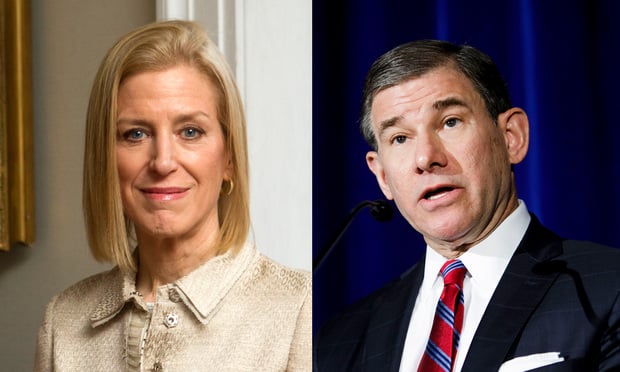'Grammatically Incoherent': 11th Circuit Splits Over Wording of Law in Student Loan Collection Case
A dissenting opinion said the majority's ruling could "only be achieved by a grammatically incoherent reading" of the statute.
February 07, 2020 at 02:24 PM
5 minute read
 Judges Beverly B. Martin (left) and William Pryor Jr. of the U.S. Court of Appeals for the Eleventh Circuit. (Photos: John Disney/ALM and Diego M. Radzinschi/ALM)
Judges Beverly B. Martin (left) and William Pryor Jr. of the U.S. Court of Appeals for the Eleventh Circuit. (Photos: John Disney/ALM and Diego M. Radzinschi/ALM)
An opinion affirming that one of the nation's leading federal student loan guaranty agencies isn't liable for aggressive tactics it employed over a nonexistent debt has ignited the second textualist split this week at the U.S. Court of Appeals for the Eleventh Circuit.
The ruling published Friday and written by Judge William Pryor Jr. of the U.S. Court of Appeals for the Eleventh Circuit provoked a strong dissent from fellow Judge Beverly Martin of the U.S. Court of Appeals for the Eleventh Circuit. Martin chastised Pryor and Judge Gregory Katsas of the U.S. Court of Appeals for the D.C. Circuit, who joined with Pryor in affirming dismissal of the case, arguing that their findings could "only be achieved by a grammatically incoherent reading" of the statute.
Pryor took issue with Martin's critique in his majority opinion, writing, "Our dissenting colleague is wrong."
Katsas was appointed by President Donald Trump in 2017. Pryor, a George W. Bush appointee, has twice been on Trump's short list for the U.S. Supreme Court. Martin was appointed by President Barack Obama.
 Judge Gregory Katsas of the U.S. Court of Appeals for the District of Columbia Circuit. (Photo: Diego M. Radzinschi/ALM)
Judge Gregory Katsas of the U.S. Court of Appeals for the District of Columbia Circuit. (Photo: Diego M. Radzinschi/ALM)On Monday, Judge Elizabeth "Lisa" Branch of the U.S. Court of Appeals for the Eleventh Circuit, a Trump appointee, wrote a textualist dissent challenging colleague Charles Wilson's majority opinion affirming the right of the Alabama State Conference of the NAACP to sue the state of Alabama under Title 2 of the 1965 Voting Rights Act.
The textualist philosophy purports to interpret the law based on their wording alone, stripped of any attempt to consider the purpose or legislative intent of the statute at issue.
Friday's ruling stemmed from a pro se case against the Pennsylvania Higher Education Assistance Agency brought by a part-time student after it garnished her wages over four student loans she said she didn't owe. After plaintiff Hope Darisaw appealed the dismissal of her case by U.S. District Senior Judge Dudley Bowen of the Southern District of Georgia, and the Eleventh Circuit granted oral argument in the appeal. Martin signed an order appointing attorney Frederick Hall of Kellogg, Hansen, Todd, Figel & Frederick in Washington, D.C., as pro bono counsel.
Darrisaw claimed the Pennsylvania Higher Education Assistance Agency notified her by letter in April 2016 that it had purchased four defaulted student loans in her name and that she was required to immediately pay the agency $18,812. Darrisaw eventually contacted the agency and was informed it had no record of any outstanding debt in her name. But in July 2016, the agency sent a garnishment order to Darrisaw's employer demanding 15% of her pay and threatened to sue if the employer didn't comply.
Darrisaw sued, contending the agency had made misleading representations and was engaging in fraudulent business practices in violation of the Fair Debt Collection Practices Act. Agency lawyers countered that it was not a debt collector because of existing loan guaranty contracts with the U.S. Department of Education that required it to collect unpaid loans from borrowers on the government' behalf. Bowen agreed and dismissed the case.
The agency is represented by a team of attorneys from Alston & Bird in Atlanta.
Pryor sided with Bowen, finding that the federal Fair Debt Collection Practices Act "makes clear" that anyone who attempts to collect a debt as part of a "bona fide fiduciary obligation" to a third party is exempt from legal limitations placed on debt collectors.
"Congress easily could have written the act to impose liability on persons who attempt to collect nonexistent debts pursuant to a fiduciary obligation," Pryor wrote. "Congress could have narrowed the exception to the definition of 'debt collector' to cover only persons attempting to collect debts 'owed or due' another—that is, it could have omitted the phrase 'asserted to be owed or due' from the exception. But Congress made a different choice."
In her dissent, Martin countered that although the Pennsylvania agency and others like it are exempt from federal fair debt collection laws when they are attempting to collect a federal student loan debt, that exemption does not extend to nonexistent debts.
Martin challenged the majority's finding that a loan guaranty agency is exempt from limitations placed on debt collectors whenever it "acts in good faith to collect a debt."
"The majority says a plaintiff bringing an [Fair Debt Collection Practices] claim against a [student loan] guaranty agency must specifically plead that the agency acted in 'bad faith,'" Martin wrote. "The words 'bad faith' do not appear in the statute, so imposing the obligation on Ms. Darrisaw to specifically plead bad faith would have required her to be able to see into the future to anticipate the interpretation of the statute given by the majority opinion here."
This content has been archived. It is available through our partners, LexisNexis® and Bloomberg Law.
To view this content, please continue to their sites.
Not a Lexis Subscriber?
Subscribe Now
Not a Bloomberg Law Subscriber?
Subscribe Now
NOT FOR REPRINT
© 2025 ALM Global, LLC, All Rights Reserved. Request academic re-use from www.copyright.com. All other uses, submit a request to [email protected]. For more information visit Asset & Logo Licensing.
You Might Like
View All
Law Firms Expand Scope of Immigration Expertise Amid Blitz of Trump Orders
6 minute read
Bass Berry & Sims Relocates to Nashville Office Designed to Encourage Collaboration, Inclusion
4 minute read
Gunderson Dettmer Opens Atlanta Office With 3 Partners From Morris Manning
3 minute read
Trending Stories
- 1Uber Files RICO Suit Against Plaintiff-Side Firms Alleging Fraudulent Injury Claims
- 2The Law Firm Disrupted: Scrutinizing the Elephant More Than the Mouse
- 3Inherent Diminished Value Damages Unavailable to 3rd-Party Claimants, Court Says
- 4Pa. Defense Firm Sued by Client Over Ex-Eagles Player's $43.5M Med Mal Win
- 5Losses Mount at Morris Manning, but Departing Ex-Chair Stays Bullish About His Old Firm's Future
Who Got The Work
J. Brugh Lower of Gibbons has entered an appearance for industrial equipment supplier Devco Corporation in a pending trademark infringement lawsuit. The suit, accusing the defendant of selling knock-off Graco products, was filed Dec. 18 in New Jersey District Court by Rivkin Radler on behalf of Graco Inc. and Graco Minnesota. The case, assigned to U.S. District Judge Zahid N. Quraishi, is 3:24-cv-11294, Graco Inc. et al v. Devco Corporation.
Who Got The Work
Rebecca Maller-Stein and Kent A. Yalowitz of Arnold & Porter Kaye Scholer have entered their appearances for Hanaco Venture Capital and its executives, Lior Prosor and David Frankel, in a pending securities lawsuit. The action, filed on Dec. 24 in New York Southern District Court by Zell, Aron & Co. on behalf of Goldeneye Advisors, accuses the defendants of negligently and fraudulently managing the plaintiff's $1 million investment. The case, assigned to U.S. District Judge Vernon S. Broderick, is 1:24-cv-09918, Goldeneye Advisors, LLC v. Hanaco Venture Capital, Ltd. et al.
Who Got The Work
Attorneys from A&O Shearman has stepped in as defense counsel for Toronto-Dominion Bank and other defendants in a pending securities class action. The suit, filed Dec. 11 in New York Southern District Court by Bleichmar Fonti & Auld, accuses the defendants of concealing the bank's 'pervasive' deficiencies in regards to its compliance with the Bank Secrecy Act and the quality of its anti-money laundering controls. The case, assigned to U.S. District Judge Arun Subramanian, is 1:24-cv-09445, Gonzalez v. The Toronto-Dominion Bank et al.
Who Got The Work
Crown Castle International, a Pennsylvania company providing shared communications infrastructure, has turned to Luke D. Wolf of Gordon Rees Scully Mansukhani to fend off a pending breach-of-contract lawsuit. The court action, filed Nov. 25 in Michigan Eastern District Court by Hooper Hathaway PC on behalf of The Town Residences LLC, accuses Crown Castle of failing to transfer approximately $30,000 in utility payments from T-Mobile in breach of a roof-top lease and assignment agreement. The case, assigned to U.S. District Judge Susan K. Declercq, is 2:24-cv-13131, The Town Residences LLC v. T-Mobile US, Inc. et al.
Who Got The Work
Wilfred P. Coronato and Daniel M. Schwartz of McCarter & English have stepped in as defense counsel to Electrolux Home Products Inc. in a pending product liability lawsuit. The court action, filed Nov. 26 in New York Eastern District Court by Poulos Lopiccolo PC and Nagel Rice LLP on behalf of David Stern, alleges that the defendant's refrigerators’ drawers and shelving repeatedly break and fall apart within months after purchase. The case, assigned to U.S. District Judge Joan M. Azrack, is 2:24-cv-08204, Stern v. Electrolux Home Products, Inc.
Featured Firms
Law Offices of Gary Martin Hays & Associates, P.C.
(470) 294-1674
Law Offices of Mark E. Salomone
(857) 444-6468
Smith & Hassler
(713) 739-1250






